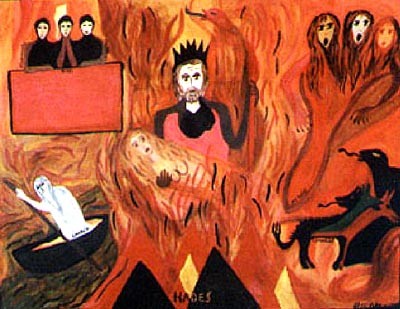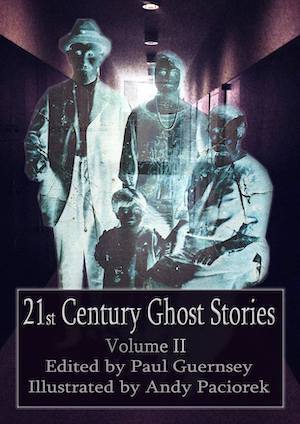When Did People Start Writing Ghost Stories?
We know that stories about ghosts are as old as language itself. Stone age peoples in most parts of the world must have traded tales and warnings about the disembodied spirits of the dead. It was only natural that after writing developed some of humankind’s earliest literature began to include some ghostly material.
Some of the first Western literature reveals a preoccupation with doing right by the dead in order to prevent their ghosts from haunting the living. Homer’s epic poem, the Illiad, written nearly 3,000 years ago, contains the following passage (23.63 in Richmod Lattimore’s translation) in which a sleeping Achilles is berated by the ghost of his slain friend, Patroclus, for failing to properly tend to his corpse, thereby preventing him from entering the Land of the Dead (Lattimore: 23.99):
There appeared to him [Achilles] the ghost (psykhe) of unhappy Patroklos all in his likeness for stature, and lovely eyes, and voice, and wore such clothing as Patroklos had worn on his body. The ghost came and stood over his head and spoke a word to him: “You sleep, Akhilleus; you have forgotten me; but you were not careless of me when I lived, but only in death. Bury me as quickly as may be, let me pass through the gates of [Hades] (pylai Aidao). The souls (psykhai), the images (eidôla) of dead men, hold me at a distance, and will not let me cross the river and mingle among them, but I wander as I am by [Hades’] house of the wide gates (eurypyles Aidos dôma). And I call upon you in sorrow, give me your hand; no longer shall I come back from death, once you give me my rite of burning.”
In this speech, the dead Patroclus essentially is threatening to continue haunting the dreams of his old companion until he receives the cremation he requires as admission to the Underworld. Of additional interest in this passage and the one that follows is Homer’s description of the ghost, which resembles its living self down to the color of its eyes, the sound of its voice, and the cut of its clothing—an archetype of ghostly form that has predominated in literature throughout the millennia and into our own time. It’s lifelike appearance notwithstanding, however, the ghost is entirely ethereal and therefore lacks the agency to interact with the living world in any way other than through words—and only then when its audience is either sleeping or on the edge of sleep:
[Achilles] with his own arms reached for him [the ghost of Patroclus], but could not take him, but the the spirit went underground, like vapour, with a thin cry, and Akhilleus started awake, staring, and drove his hands together, and spoke, and his words were sorrowful: “Oh wonder! Even in the house of [Hades] (Aïdao domoisi) there is left something, a soul and an image, but there is no real heart of life in it.”
This insubstantiality and relative helplessness also has remained part of the predominant template for literary depictions of ghosts—though of course there have been exceptions.
In The Odyssey, his epic sequel to the Illiad, Homer deepens his description of the ghostly Underworld, thereby illustrating the very bleak notions of the afterlife held by the ancient Greeks. Hades essentially was a cold, dark, subterranean warehouse in which the spirits of the dead—properly viewed as ghosts or “shades” rather than souls, because they lacked all possibility of improvement or redemption—would wander forever, lamenting the fact that they were no longer alive. Merit or virtue in life mattered not a bit; the ghosts of heroes and villains alike endlessly roamed the Fields of Asphodel—so named for a tasteless weed that served as their only food. (Only after Homer’s time would ancient Greek imaginations expand Hades to include the Elysian Fields—essentially a hospitality lounge where the shades of the heroic and the good enjoyed food and accommodations superior to those forever inflicted on the greater mass of dead humanity.)
It is in Book 11 of The Odyssey—known as The Book of the Dead by the ancient Greeks—that Homer introduces two more traditional uses for ghosts in literature: as suppliers of information of utility or interest to a protagonist, and as chroniclers of the afterlife. Following his sojourn on Circe’s island, Odysseus sails his ship to the entrance of the Underworld, where he summons an array of ghosts, the most important of which is the Theban soothsayer, Teiresias, and proceeds to interview them one by one on various matters (Lattimore, 11.1):
But when with vows and prayers I had made supplication to the tribes of the dead, I took the sheep and cut their throats over the pit, and the dark blood ran forth. Then there gathered from out of Erebos the spirits of those that are dead, brides, and unwedded youths, and toil-worn old men, and tender maidens with hearts yet new to sorrow, and many, too, that had been wounded with bronze-tipped spears, men slain in fight, wearing their blood-stained armour. These came thronging in crowds about the pit from every side, with a wondrous cry; and pale fear seized me. Then I called to my comrades and bade them flay and burn the sheep that lay there slain with the pitiless bronze, and to make prayer to the gods, to mighty [Hades] and dread Persephoneia. And I myself drew my sharp sword from beside my thigh and sat there, and would not suffer the powerless heads of the dead to draw near to the blood until I had enquired of Teiresias.
The ghost of Teiresias does indeed give Odysseus the instructions he desires for returning to his home and his wife on the Island of Ithaca. In addition, Odysseus talks to his dead mother, who chronicles for him (and for the reader) the atmosphere and part of the geography of the Underworld (Lattimore 11.151):
My child, how didst thou come beneath the murky darkness, being still alive? Hard is it for those that live to behold these realms, for between are great rivers and dread streams; Okeanos first, which one may in no wise cross on foot, but only if one have a well-built ship.
In a heartrending scene, Homer illustrates the bottomless and unbridgeable chasm between ghosts and the living through Odysseus’ attempts to embrace his mother’s shade:
Thrice I sprang towards her, and my heart bade me clasp her, and thrice she flitted from my arms like a shadow or a dream, and pain grew ever sharper at my heart. And I spoke and addressed her with winged words : “My mother, why dost thou not stay for me, who am eager to clasp thee, that even in the house of [Hades] we two may cast our arms each about the other, and take our fill of chill lamenting. Is this but a phantom that august Persephoneia has sent me, that I may lament and groan the more?” So I spoke, and my honored mother straightway answered: “Ah me, my child, ill-fated above all men, in no wise does Persephoneia, the daughter of Zeus, deceive thee, but this is the appointed way with mortals when one dies. For the sinews no longer hold the flesh and the bones together, but the strong might of blazing fire destroys these, as soon as the life leaves the white bones, and the spirit, like a dream, flits away, and hovers to and fro.”
Odysseus also talks to his unfortunate crewmember, Elpenor, who perished in a drunken fall from Circe’s rooftop. Elpenor ruefully describes his own death, and then he voices the ancient, ghostly demand for a proper burial—and threatens retribution if he fails to receive it (Lattimore 11:51):
“There, then, O prince, I bid thee remember me. Leave me not behind thee unwept and unburied as thou goest thence, and turn not away from me, lest haply I bring the wrath of the gods upon thee. Nay, burn me with my armour, all that is mine, and heap up a mound for me on the shore of the grey sea, in memory of an unhappy man, that men yet to be may learn of me. Fulfil this my prayer, and fix upon the mound my oar wherewith I rowed in life when I was among my comrades.” So he spoke, and I made answer and said: “All this, unhappy man, will I perform and do.”
The fact that the ghosts are lured to the very boundary of Hades by Odysseus’ offering of blood underscores the primal, pre-Christian belief that life holds all that is truly precious, and that any afterlife is but a cold shadow of our mortality. After all, there is no more powerful a symbol of life than blood, and Homer’s ghosts are desperate to drink their fill.


